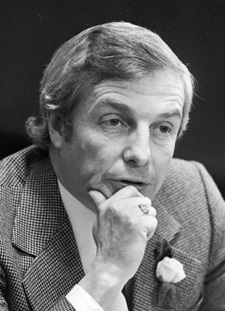Will Licia Corbella write another hysterical column assailing the latest proposal to destroy Alberta’s economy, pump all the oil back into the sand, send our workers home to Newfoundland and sow the earth with salt?
One would hope so, if only for the sake of consistency and decency.
Of course, the last time the overwrought Calgary Herald columnist wrote something like this — claiming NDP Leader Jack Layton “would tank our economy” — there was a federal election campaign underway and the Alberta media was campaigning openly for Prime Minister Stephen Harper’s Conservatives.
The latest version of the proposal to wreak what Corbella called a “frightening, destabilizing, impoverishing scenario” has now been made by Peter Lougheed, the revered former Conservative premier of Alberta.
In an interview in Corbella’s own paper on Tuesday, the 82-year-old Lougheed called for two of the three ideas Layton proposed during the election campaign that prompted the columnist’s apocalyptic screed. To wit: higher corporate taxes and orderly development of the Athabasca oil sands. Lougheed appears to have left out a cap-and-trade program to reduce emissions in the carbon-intensive oilsands.
Layton’s (and Lougheed’s) proposed tax increases “would be devastating to Canada’s fragile economic recovery,” Corbella hyperventilated back in the day. Developing the oilsands in an orderly fashion, she added then, “will devastate Alberta.”
Well, here’s what Alberta’s most successful Conservative premier, the one generally credited with keeping this province on the path to prosperity, had to say: “The decline in natural-gas revenues has been dramatic and the degree to which we are dependent on oil revenues, it is time for us to consider an increase in corporate and personal tax.” (Emphasis added.)
Lougheed also called for Alberta, in the words of the Herald’s reporter, to “take steps now to avoid the overheated economy that made Alberta a high-cost place to do business in the boom of the mid-2000s. … That could be done by moving to ‘orderly,’ phased-in development of the oilsands, he said.”
“No more than two projects should be underway at the same time, one in the early stage and one in the later stage and I think that’s very manageable,” Lougheed, who was premier from 1971 to 1985, told the Herald. And if the oil companies didn’t like that, he added, “we are the owner and we have the mandate to do that.”
The former premier also sensibly advocated processing as much bitumen as possible within our borders, and not shipping jobs and revenue to the United States.
Mind you, in the Herald’s defence, the way Lougheed carried on as premier — building hospitals, buying airlines to keep jobs in Alberta and saving money from the oilpatch for the people of Alberta instead of pissing it away on tax breaks and record-low royalties for industry — he might as well have been a New Democrat!
Indeed, Lougheed was the last Conservative premier of this province to behave like a grownup on economic policy. Every one of the rest of them have merely been coasting on his reputation as a builder, not a wrecker. So where did all that money go?
Lougheed, in fact, did pretty much what the NDP advocates do nowadays, and Alberta is a better place for it.
But don’t hold your breath waiting for the Herald or any other Alberta media operation to admit the obvious — that our beloved former Conservative premier and the leader of the federal NDP are advocating pretty much the same thing when it comes to developing the oilpatch. That was then, after all, and this is now.
What’s more, don’t expect the Alberta media, the Harper government or the government of Alberta to pay any more attention to Peter Lougheed’s suggestions than they do to Jack Layton’s.
The only way we’ll get sane policies in the oilsands is by electing politicians who think like Lougheed. And nowadays they’re not Conservatives.
This post also appears on David Climenhaga’s blog, Alberta Diary.




